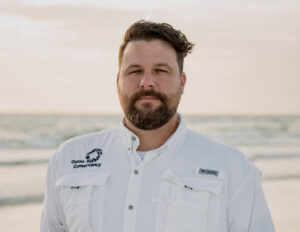Jon Paul “J.P.” Brooker
These are particularly challenging times for Florida’s precious environment.
We’ve lost more than 1,000 manatees in a single year, a record no one wants to set. Tens of thousands of acres of seagrass have been lost. Thousands of tons of fish have been killed by Red Tide. Add in the Piney Point disaster, which resulted in more than 400 million gallons of toxic, nutrient-rich water spilling into Tampa Bay and further fueling Red Tide.
And Florida remains ground zero for sea level rise, with more homes and businesses threatened by chronic flooding than anywhere else in the nation.

Yet there is real potential for some good news. The Florida Legislature has an enormous opportunity during its 2022 session to tackle these challenges and continue work to ensure there are healthy oceans and coasts for generations to enjoy.
First, Gov. Ron DeSantis and state lawmakers can build on the important work they already have done to make Florida more resilient to the changing oceans and climate. Last fall, DeSantis wisely appointed a new chief resilience officer to coordinate state efforts with those of local governments. A statewide strategy is essential to effectively meet these challenges head-on.
This year, the Legislature should make the chief resiliency officer permanent by enshrining it in state law and providing funding for an Office of Resilience. The office should be formally assigned to create a statewide strategy for addressing sea level rise and to coordinate efforts with the appropriate government agencies throughout the state. Making these changes will ensure accountability within the governor’s office and provide a single point of contact responsible for planning and overseeing a comprehensive, coordinated approach to making our state more resilient to rising waters, stronger storms and hotter weather.
Another small change to state law also could make a big difference. There are many construction projects in the state that are in the planning stages and should be designed to accommodate rising sea levels. Yet there is no consistency regarding what sea level rise data should be used by planners.
A small change to state law can avoid wasting time and public money. Lawmakers should require state departments to use the most recent sea level rise data from the National Oceanic and Atmospheric Administration (NOAA) when designing projects. That is a logical approach that would save taxpayers billions in the long run and protect Florida’s coastal economy.
Legislators also have other opportunities to protect and improve the environment. Lawmakers should strengthen the effectiveness of basin management action plans, which are one of the primary ways to improve and restore water quality. They also should codify recommendations of the Blue Green Algae Bloom Task Force to better protect our ocean and coastlines from the ravages of nutrient pollution and harmful algal blooms.
Lawmakers also should approve a common-sense change that could preserve our beaches and protect wildlife: Give local governments the authority to ban smoking on their beaches, and ban smoking in state parks. For decades, cigarette butts — small fibrous bundles of plastic — have been the most common item found in annual clean-ups of our beaches. Banning smoking on beaches is an easy way to solve a long-standing problem.
Jon Paul “J.P.” Brooker is the director of Florida Conservation and lawyer for Ocean Conservancy, the nation’s oldest marine conservation non-profit organization.
Photo credit: NOAA National Marine Sanctuaries


